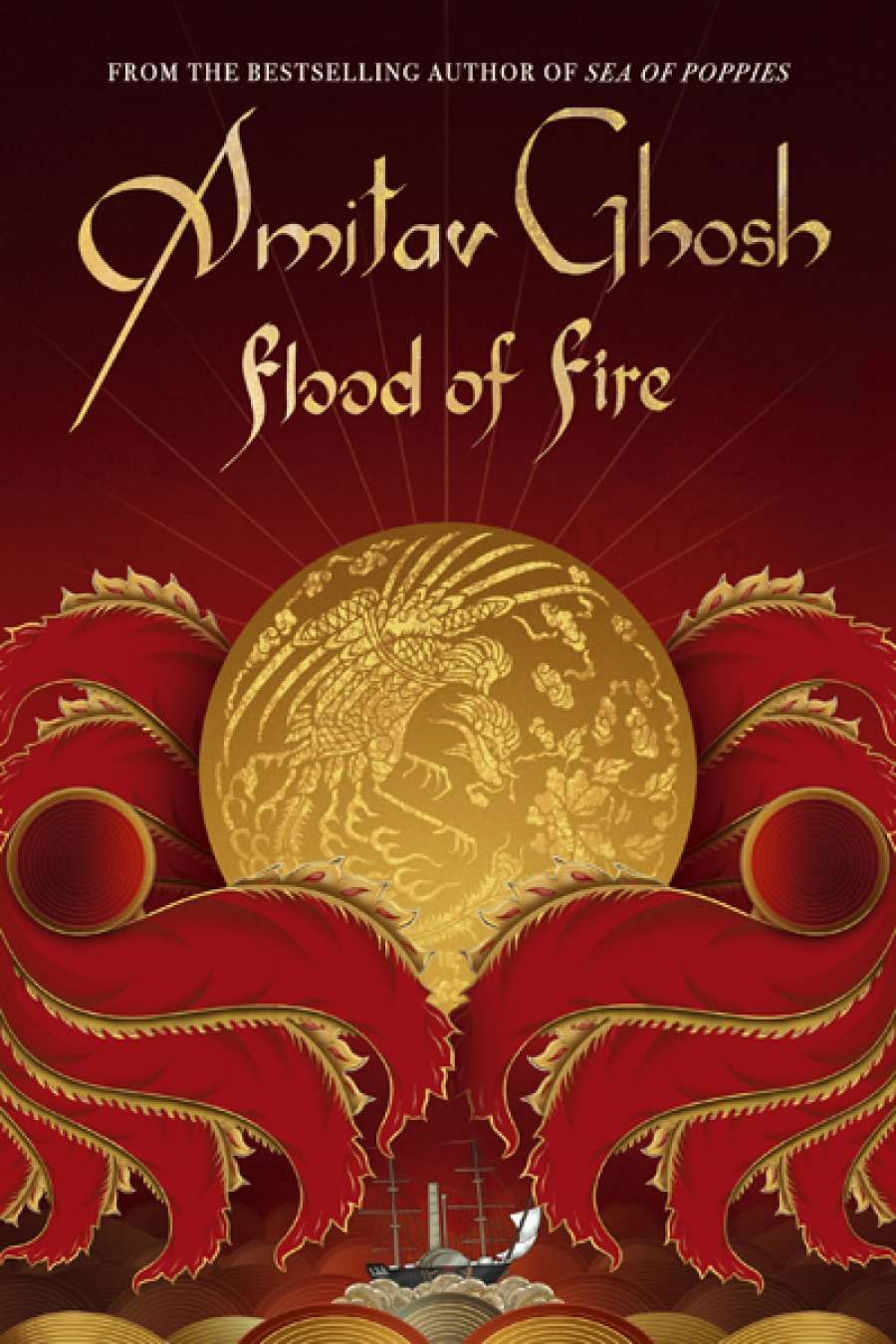
- Free Article: No
- Contents Category: Fiction
- Custom Article Title: Claudia Hyles reviews 'Flood of Fire' by Amitav Ghosh
- Book 1 Title: Flood of Fire
- Book 1 Biblio: Hachette, $29.99 pb, 616 pp, 9780719569012
Kesri's family cultivates poppies not far from Ghazipore's opium factory. He is aware of East India Company pressure on farmers to grow it, to the detriment of their normal food crops and livelihood. Shireen Modi in Bombay learns of her husband's tragic death in Hong Kong and of his enormous debts caused by the Chinese seizure and destruction of his cargo of opium. Entwined belief in both free trade and the Gospel easily justifies the opium trade for Mr Burnham, a wealthy Calcutta nabob, and younger men like Zachary Reid are keen to claim their share of the lucrative business. Throughout the book the beautiful, dangerous poppy visits its metaphor for sleep, peace, or death on characters.
Ghosh was one of a group of young Indian writers whose way was paved by Salman Rushdie in the 1980s. Younger than the Midnight's Children of 1947, Ghosh was born in 1956; he is an inheritor of Rushdie's reinvigoration of English writing in India. Those themes included a fresh interest in history, sexual frankness, and an enthusiasm for exploration into language; they are still apparent in Ghosh's writing.
Words are an obsession in Flood of Fire. Neel, a well-educated Bengali, working as a secretary in Canton, describes his Chinese friend Compton as 'perhaps the only person of my acquaintance who is as besotted with words as I am'. Compton's English-language printing press suffers after the expulsion of the British from the city. Drawn into other employment, he monitors regional English journals for Chinese officials and seeks Neel's help to translate Indian words. Ghosh must be smiling as his far-reaching trilogy is littered with obscure Indian archaisms.
Ghosh also has fun with spelling. Mistri or mistry is the usual spelling for an artisan. In sixteenth-century English, mystery had the meaning of a craft or trade, but it seems Ghosh is being puckish when Zachary, originally a ship's carpenter, is referred to as a 'trained mystery' or an 'experienced mystery' and Mrs Burnham has told her daughter 'it isn't decent for a girl to talk to mysteries'. Her efforts to cure Zachary of the 'filthy imaginations' of onanism result in rather irritating descriptions of energetic sexual romps which will enlarge anyone's vocabulary. To complete the mistri mystery, the name of Shireen Modi's Parsi family's company is Mistrie & Sons. Modi is later spelled Moddie by the British, who have always arranged spelling and pronunciation to suit themselves.
'He is an inheritor of Rushdie's reinvigoration of English writing in India'
And what of the Hind, the ship requisitioned to transport a regiment of sepoys to China? As well as soldiers and camp followers, other passengers in first-class cabins have Chinese destinies to pursue. Does hind mean a female deer, fleet of foot, symbolic of the enticing lure of new adventure and reminiscent of Sir Francis Drake; or is it the Persian and Arabic name for the Indian sub-continent?
 Amitav Ghosh (photograph by Jerry Bauer)
Amitav Ghosh (photograph by Jerry Bauer)
Military manoeuvres and battle descriptions are exciting and tense; Ghosh handles his characters carefully, placing them perfectly to enliven historical details. The maps are an excellent aid to further authenticity. Actual dates such as Queen Victoria's birthday, which delayed engagement until after the noon salute, or that of the Hong Kong land auction day, synchronise with fictional action. Historical characters such as General Gough or Commissioner Lin lend reality to all the novel's characters – fifers Raju and Dicky, Jodu the Muslim lascar, Parsi seths and Chinese houseboat-dwellers, as well as the major figures.
Babu Nobo Krishna Panda, known to the British as Baboo Nob Kissin, speaks of Kaliyuga, the epoch of apocalypse, and believes that the English are destined as instruments of the gods to bring about the world's end. Though kinder and more practical, Ghosh's character has whispers of the past or future ghosts of Professor Godbole from A Passage to India. Godbole was E.M. Forster's voice for cosmic and divine truth and, though odd, was a man of goodwill. The Brahmins together might say that individual suffering is of little consequence in world order, small consolation to many of this book's characters. Today's truth is that opium became identified with all that was wrong with Manchu rule in China; the humiliation of European imperial control, still a national wound, led to revolution; and Britain has learned to live without empire.


Comments powered by CComment